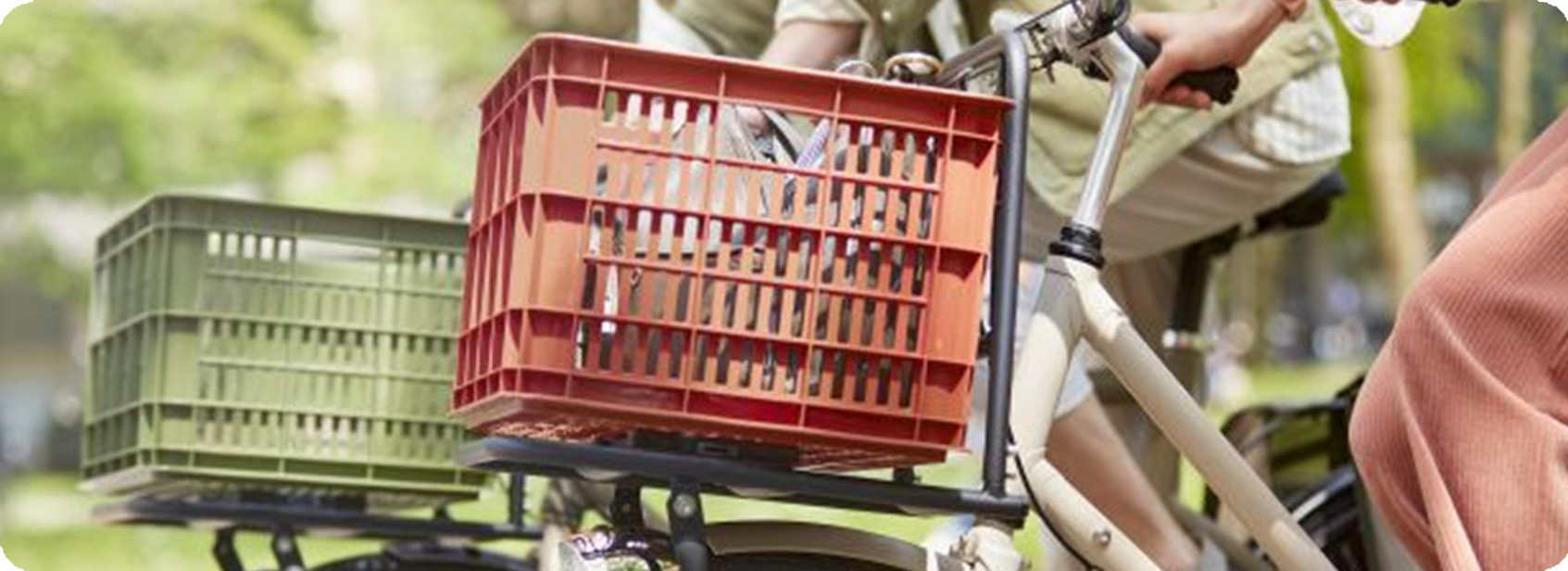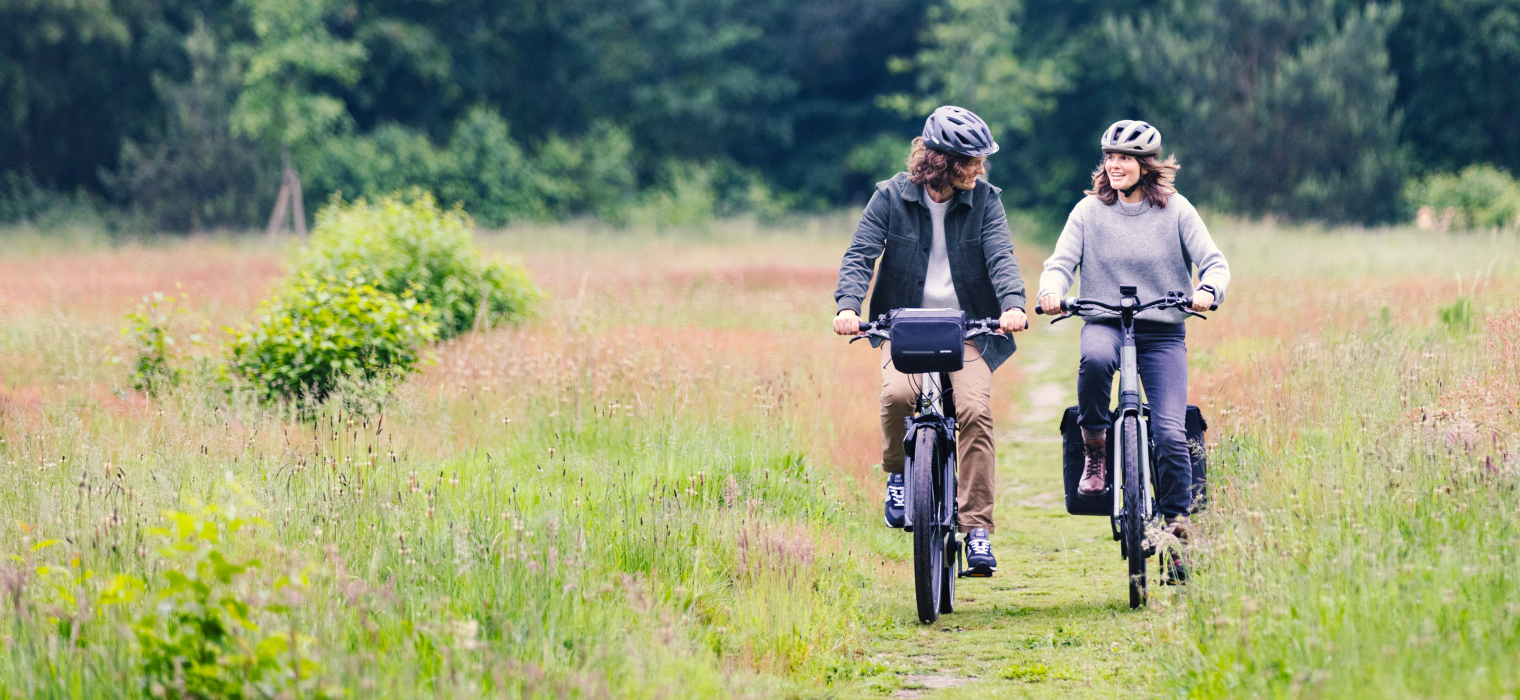Basil proves: more sustainable is not more expensive
- Posted on

More sustainable is not more expensive. With that slogan, bicycle accessory manufacturer Basil makes sustainable products by the score. With the 'stunner' being the plastic bicycle crate. This crate is now made of one hundred percent recycled plastic. While supporting an acceptable profit margin, the selling price has actually been lowered. Marthijn van Balveren talks about this innovation, which reduces the use of virgin plastic in his company by about 75 percent.

'Re-cycling,' This apt product name was claimed and filed by Basil ten years ago, back in 2012. At the time, the company from Ulft in Gelderland, The Netherlands, was working on bicycle bags made from residual and natural materials. “It wasn't a stunner,” says Van Balveren. “The colors were too high-fashion for that time.” But, Basil continued, based on the belief that it can be more environmentally friendly. With bicycle bags made of PET bottles and pfas-free rainwear, the bar keeps being raised. Meanwhile, the discussion about what is genuinely sustainable continues within the company. Is that bag made of organic cotton? Or a product made of plastic that can't be broken? “The most sustainable product is the one that lasts,” says the entrepreneur. “Longevity is the key to sustainability. To my mind, a T-shirt made of organic cotton that only lasts a year is not sustainable. Since last year, we have offered a 10-year warranty on our eco-friendly canvas bicycle bags.”
Di-Plast
The bicycle crates made from recycled plastic reflect the long life and environmentally friendly raw material. “We had the bicycle crates produced in Asia up to early 2022. The production took place far away, and they were produced with virgin material, new plastic, which is made from petroleum. With the vouchers from Di-Plast, we invested in researching an alternative,” says Van Balveren. “In a year and a half, we came up with a new formula and put that into production.”
“As long as you know what you don't know, you can achieve a lot,” is his conviction. “We do not know which plastic is best suited for our bicycle crates. We work with a team of 25 people, of which only a small number focus on product development. That is why we involved a specialist. He helped us in our search for suitable recycled plastic. Together we evaluated everything: what about discoloration, what is the influence of UV on the product, what forces can the crate withstand, and how does the material react to extreme cold and heat?”
Reshoring
Basil now gets the raw material from a Dutch company. “Reshoring, or in other words: the raw material comes from our own country; the production is automated and performed in the Netherlands. The raw material is one hundred percent household waste. Just goes to show that it is possible to make something new from waste.”
And it's not even more expensive than our former production in Asia. “Logical too,” says the down-to-earth entrepreneur, “because surely if you make something from waste, it can never be more expensive than virgin material, right?”
The developed and purchased molds did require ‘a best investment’ policy, with the payback period estimated at three years. “But such an investment is part of entrepreneurship,” says Van Balveren. And then, with a wink, “we assume that the Netherlands will need bicycle crates for well over three years.” We also took the opportunity to make the three sizes of crates now in such a way that they can be stacked. This saves an awful lot of space during transportation. Better for the environment and cheaper. So once again, it turns out: more sustainable is not more expensive.
The raw material for the crates accounts for about 75 percent of Basil's total plastic needs. And that is now all recycled plastic, so a massive saving on virgin plastic and a saving of roughly 350,000 liters of crude oil per year.
Environmental tax included in the price
Van Balveren advocates a broader view of sustainability. “It is not only about where it is produced or with which material. It is also about whether it is easy to transport, how it is transported, how long it lasts, and what can be done with it after use. I would like to see the complete environmental impact of a product included in the selling price. This is what is called true pricing. That way, the environmentally friendly products place themselves in the market; the more environmental tax, the higher the selling price. I understand it is not simple to get this done; to begin with, the whole EU would have to endorse and support the concept.”
Price and quality
Basil does not expect consumers to prefer durability over convenience, price, or quality. “The consumer just wants an attractive and good quality product for an excellent price. And the fact that it is also sustainable is considered a nice bonus,” says the entrepreneur. “But price and quality come first. And it should be hip and attractive. That's why we work on sustainability in the background. It is in our DNA, and we don't want to bother the customer with it.”
Marthijn van Balveren is happy to help entrepreneurs by telling them about Basil's approach. Contact him at: [email protected].
Di-Plast
Di-Plast is an INTERREG project in which various parties and knowledge institutions in Germany, Luxembourg, and Southern and Eastern Netherlands work together to break down barriers to using recyclate. Oost NL from Eastern Netherlands is the initiator of Di-Plast and developed this project together with the Polymer Science Park on behalf of the provinces of Overijssel and Gelderland, the Netherlands.
Source Article: Oost NL

